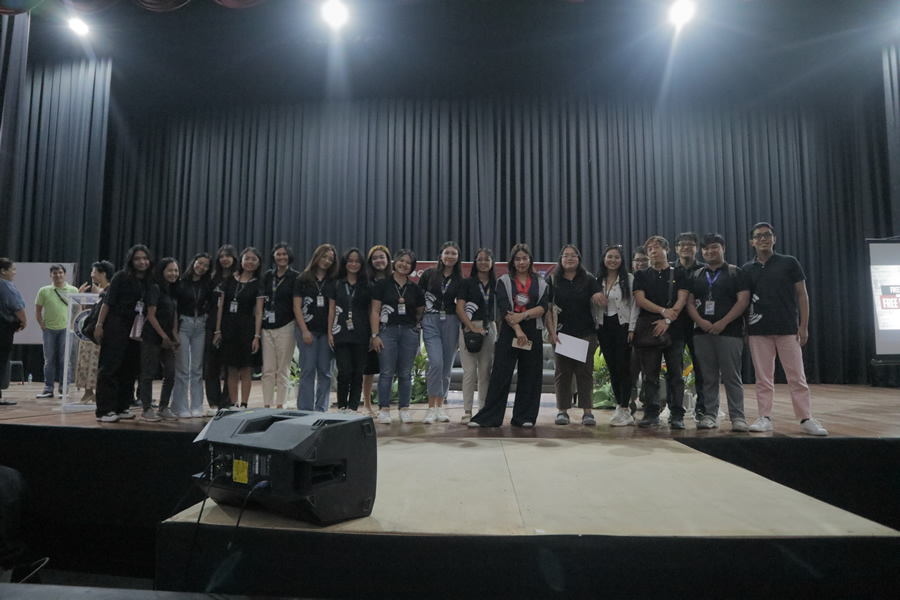by Chelsea Marie S. Sermonia, BAComm-4, Centralian Link Intern
Selected students of CPU Bachelor of Arts in Communication, together with the resource speaker Karmina Constantino. Photo credits to WVSU Film Society.
In an era rife with misinformation and growing skepticism towards traditional media, the importance of responsible journalism cannot be overstated. Recognizing this urgency, the 2024 Marshall McLuhan Forum Series on Responsible Media recently convened in the Philippines, shedding light on the role of journalists in fostering critical public discourse and seeking accountability in the post-truth landscape.
Co-hosted by the West Visayas State University (WVSU) College of Communication, in collaboration with various partners including the WVSU International and Local Linkages Office, the forum was made possible through the generous support of the Embassy of Canada. Held at the WVSU Cultural Center, the event provided a vital platform for stakeholders to collectively reflect on the evolving media landscape and the imperative for responsible media practices. Centralian students of the Department of Languages, Mass Communication, and Humanities attended the activity.
The forum commenced with a warm welcome from Prof. Rona Dhel C. Alingasa, Dean of the College of Communication, who emphasized the pivotal role of journalists in shaping public opinion and the need for ethical reporting standards. This sentiment was echoed by WVSU President Joselito F. Villaruz, M.D., Ph.D., who highlighted the significance of media platforms in advancing sustainable development goals and commended the initiative undertaken by the forum.
The resource speaker was Anna Karmina Balderama Constantino-Torres, known professionally as Karmina Constantino, a distinguished journalist and the 2022 Marshall McLuhan Fellow. Drawing from her extensive experience as a news anchor, she explored the challenges facing contemporary journalism, including the erosion of factual accuracy and the increasing targeting of journalists. She invoked the Golden Age of Philippine Media as a testament to the resilience of a free press in the face of adversity, emphasizing that no shackles can stifle the determination of journalists committed to upholding the truth.
After the lecture, a panel of reactors comprising legal experts and media practitioners provided valuable insights into the complexities of media regulation and the evolving role of journalists in holding power to account. Atty. May Castillo, Mr. Jeremy Brian Valle, and Ms. Bea Grace Subega engaged in a spirited discussion, underscoring the indispensable role of the media in safeguarding democracy and promoting transparency.
During the forum session, Ms. Joesyl Marie Aranas, Division Chair of WVSU Development Communication, facilitated a discussion that included a question from Thresha Marie Gallos, a 4th Year BA in Communication student, who asked how to combat rampant disinformation. Karmina Constantino stressed the importance of relentless efforts in the ongoing battle for truth, acknowledging that victory may not be immediate, but the fight is imperative.
Prof. Edel Carmela Subong-Csoka, WVSU Director of the International and Local Linkages Office, delivered closing remarks, expressing gratitude to all involved in making the forum a success. The event concluded with a photo opportunity, symbolizing the collective commitment to responsible media practices and fostering critical public discourse in the Philippines. This year’s Marshall McLuhan Forum Series emphasized the vital role of responsible journalism in combating misinformation and fostering critical public discourse. The event underscored the importance of upholding ethical reporting standards in today’s media landscape.

